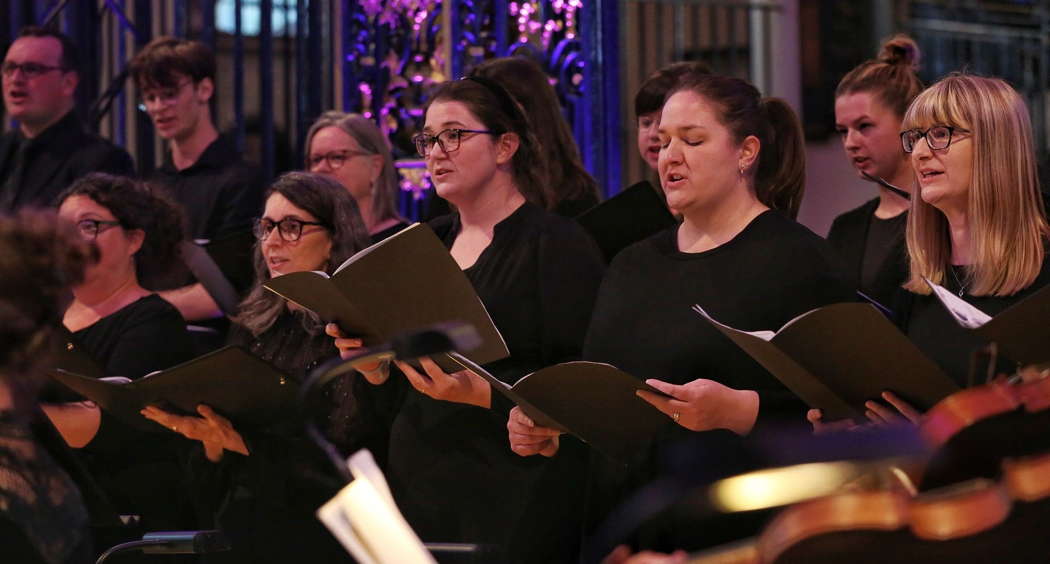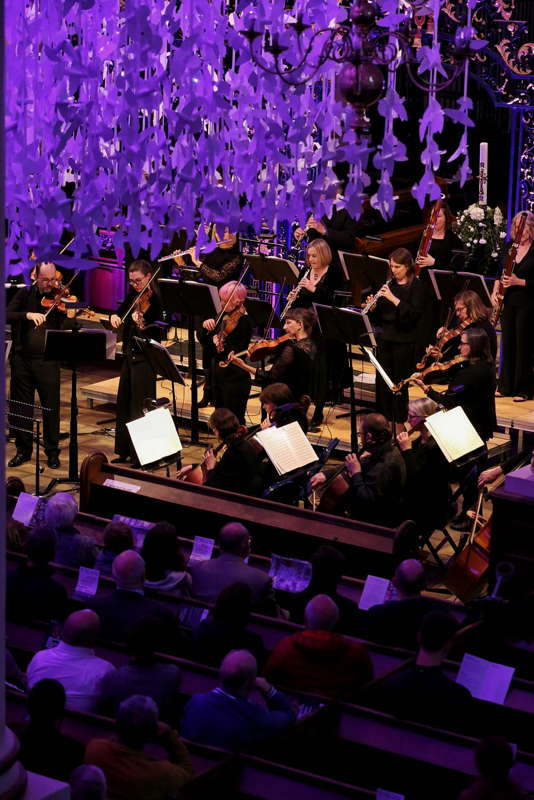 CENTRAL ENGLAND: Mike Wheeler's concert reviews from Nottingham and Derbyshire feature high profile artists on the UK circuit - often quite early on their tours.
CENTRAL ENGLAND: Mike Wheeler's concert reviews from Nottingham and Derbyshire feature high profile artists on the UK circuit - often quite early on their tours.
Becoming One
MIKE WHEELER listens to music by Raphael Clarkson, Cecilia McDowall, Beethoven, Bartók, Preetha Narayanan and Mozart to celebrate Sinfonia Viva's fortieth anniversary
A fortieth symphony for a fortieth birthday party makes for a neat bit of programming – Derby Cathedral, Derby, UK, 4 May 2022. The symphony was Mozart's, the birthday was Sinfonia Viva's. Founded in 1982 as The East of England Orchestra, 'Viva', as it is colloquially known, is thoroughly embedded in the cultural life of the East Midlands, and to judge from a brief conversation with the new CEO, Lucy Galliard, that's about to be ramped up further.
Raphael Clarkson's A Call From on High was commissioned by Viva in 2017 for two horns and two trumpets, to be played from the roof of Derby Cathedral's tower. The third movement is, in effect, a chorale prelude on the hymn tune 'All Saints', one of the tunes played regularly by the Cathedral carillon. It worked well as a stand-alone piece, opening the evening with a suitably celebratory peal, and with an equally effective quiet ending.
The remaining players then joined their colleagues, and remained standing (with the obvious exceptions) for the rest of the concert – which, as so often, gave extra impact to the sound (and more on sound later).
Cecilia McDowall's Rain, Steam and Speed was prompted by Turner's well-known 1844 painting of the same title, showing a train crossing Brunel's viaduct over the Thames at Maidenhead. But this is no re-run of Honegger's Pacific 231. Instead, our attention is drawn equally to other elements: a gentle string chorale to evoke the surrounding landscape, rippling clarinet figures to suggest the hare running away down the track (barely perceptible in the painting), timpani and low strings supplying the equivalent to the dark shape that dominates the centre of the picture. McDowall's skill in making the music move at two different speeds simultaneously is equally impressive, and the distancing at the end is handled with a sure touch. Conductor Delyana Lazarova ensured every detail was firmly in place.
Sophie Rosa, who will be stepping down as leader at the end of the current season, was the soloist in Beethoven's Romance No 2, joining her colleagues in a performance that was serene and lyrical without becoming saccharine, giving due weight to the sterner middle section, then melting back beguilingly into a no-fuss ending.

Sophie Rosa with Delyana Lazarova and members of Sinfonia Viva in Derby Cathedral on 4 May 2022. Photo © 2022 Ali J Photography
In a vivid account of Bartók's Romanian Folk Dances, 'Stick Dance' was earthy, 'Sash Dance' light on its feet. 'On One Spot' showcased Nicky Hunter's plaintively bird-like piccolo, followed by a soulful 'Horn Dance'. 'Romanian Polka' and 'Sash Dance 1 and 2' were invigoratingly punchy.
Sing Viva, the orchestra's associated carers' choir, was featured in Becoming One, by Preetha Narayanan. Scored for chorus, strings and percussion, it is the result of a collaboration between choir and composer, exploring 'breath in all its meanings'. Drawing on the Indian raga 'Charukeshi', it gradually pulls its opening fragments together into a dancing middle section. At the end, the voices are left unaccompanied, signing off to the words 'singing together, becoming one'. A highly attractive work which Sing Viva handled with complete confidence, and which I can well imagine other choirs taking to readily.

Members of Sing Viva performing Becoming One in Derby Cathedral on 4 May 2022. Photo © 2022 Ali J Photography
In Mozart's Symphony No 40, Lazarova's incisive conducting, and Viva's alert response, kept a taut hold on the music's structure, and showed that it is possible to take the first movement at a real allegro molto without it sounding over-driven. Their account of the second movement suggested a latent minuet, while missing none of the underlying tensions. The actual minuet had a rhythmic energy that brought it within hailing distance of the Bartók. The force and vigour spilled over into the finale with, again, a structural grip balancing the storm and stress. The passage of lurching tonality was a properly unsettling moment in a performance that blazed with vitality.
Derby Cathedral is currently hosting 'Peace Doves', an art installation suspended over the nave. It makes a powerful visual impact in its own right, but also made a big difference to the sound, soaking up some of the building's reverberation, and giving the music more sonic precision and hence impact.

Members of Sinfonia Viva with part of the 'Peace Doves' art installation in Derby Cathedral on 4 May 2022. Photo © 2022 Ali J Photography
During the reception that followed, Viva players Matthew Dunn, clarinet, Tim Gunnell, vibes, and David Ayre, bass, served up some cool jazz from the Cathedral's west end.
Copyright © 12 May 2022
Mike Wheeler,
Derby UK

MORE ARTICLES ABOUT SINFONIA VIVA



